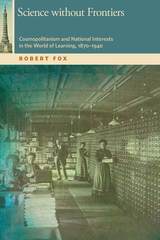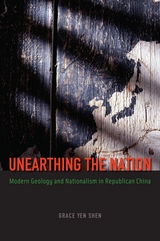2 books about Nationalism and science

Science Without Frontiers
Cosmopolitanism and National Interests in the World of Learning, 1870–1940
Robert Fox
Oregon State University Press, 2016
In his long career, Robert Fox has specialized in the history of the physical sciences, particularly in France since 1700. In Science without Frontiers, he explores the discipline of science as a model for global society.
Fostered by international congresses and societies, scientific collaboration flourished across linguistic and national borders from the mid-nineteenth century up until, and even after, the First World War. Projects such as the universal language Esperanto and the Dewey decimal system relied on optimistic visions of the future and were fueled by dramatic improvements in communications and transportation. The Institut international de bibliographie, founded in Brussels in 1895, emerged as a center for this collaborative endeavor.
After the First World War, scientific internationalism met with new challenges as governments increasingly sought to control the uses of science and technology. Fox details the fate of cooperative scientific internationalism in Europe and the challenges posed to it by the rise of totalitarianism and the increasingly conflicting force of nationalism. He explores public expressions of scientific nationalism in museum exhibits and, most tellingly, in rival national pavilions at the Paris International Exposition of 1937.
World War II might have shattered internationalist ideals for good, but grounds for optimism remain in the successes of international organizations like UNESCO and in the potential of electronic media as a way to achieve a vision of universal access to knowledge. Science without Frontiers offers a new way to think about science and culture and its relationship to politics amid the crises of the twentieth century.
Fostered by international congresses and societies, scientific collaboration flourished across linguistic and national borders from the mid-nineteenth century up until, and even after, the First World War. Projects such as the universal language Esperanto and the Dewey decimal system relied on optimistic visions of the future and were fueled by dramatic improvements in communications and transportation. The Institut international de bibliographie, founded in Brussels in 1895, emerged as a center for this collaborative endeavor.
After the First World War, scientific internationalism met with new challenges as governments increasingly sought to control the uses of science and technology. Fox details the fate of cooperative scientific internationalism in Europe and the challenges posed to it by the rise of totalitarianism and the increasingly conflicting force of nationalism. He explores public expressions of scientific nationalism in museum exhibits and, most tellingly, in rival national pavilions at the Paris International Exposition of 1937.
World War II might have shattered internationalist ideals for good, but grounds for optimism remain in the successes of international organizations like UNESCO and in the potential of electronic media as a way to achieve a vision of universal access to knowledge. Science without Frontiers offers a new way to think about science and culture and its relationship to politics amid the crises of the twentieth century.
[more]

Unearthing the Nation
Modern Geology and Nationalism in Republican China
Grace Yen Shen
University of Chicago Press, 2014
Questions of national identity have long dominated China’s political, social, and cultural horizons. So in the early 1900s, when diverse groups in China began to covet foreign science in the name of new technology and modernization, questions of nationhood came to the fore. In Unearthing the Nation, Grace Yen Shen uses the development of modern geology to explore this complex relationship between science and nationalism in Republican China.
Shen shows that Chinese geologists—in battling growing Western and Japanese encroachment of Chinese sovereignty—faced two ongoing challenges: how to develop objective, internationally recognized scientific authority without effacing native identity, and how to serve China when China was still searching for a stable national form. Shen argues that Chinese geologists overcame these obstacles by experimenting with different ways to associate the subjects of their scientific study, the land and its features, with the object of their political and cultural loyalties. This, in turn, led them to link national survival with the establishment of scientific authority in Chinese society.
The first major history of modern Chinese geology, Unearthing the Nation introduces the key figures in the rise of the field, as well as several key organizations, such as the Geological Society of China, and explains how they helped bring Chinese geology onto the world stage.
The first major history of modern Chinese geology, Unearthing the Nation introduces the key figures in the rise of the field, as well as several key organizations, such as the Geological Society of China, and explains how they helped bring Chinese geology onto the world stage.
[more]
READERS
Browse our collection.
PUBLISHERS
See BiblioVault's publisher services.
STUDENT SERVICES
Files for college accessibility offices.
UChicago Accessibility Resources
home | accessibility | search | about | contact us
BiblioVault ® 2001 - 2024
The University of Chicago Press









